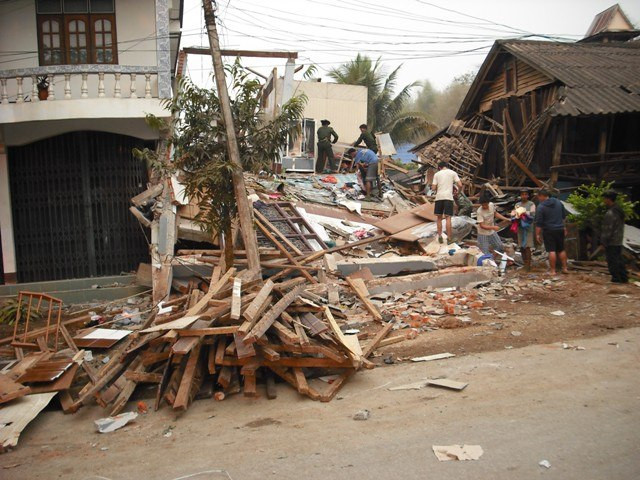Rescue operations intensified across Myanmar and Thailand on Monday following a devastating 7.7-magnitude earthquake that has claimed the lives of over 2,000 people. The death toll in Myanmar alone has reached at least 2,065, with more than 3,900 injured and over 270 still missing, according to state media. Efforts to locate survivors continued in the Thai capital, Bangkok, where an unfinished skyscraper collapsed, killing 12 and leaving 75 unaccounted for.
In Mandalay, Myanmar's second-largest city and near the epicenter of the quake, Chinese rescue workers pulled survivors from the rubble of flattened buildings. Xinhua, China's state-run news agency, reported that four people, including a pregnant woman and a young girl, were rescued from collapsed structures in the city. Drone footage showed widespread devastation, with entire buildings pancaked into layers of concrete while temples remained partially intact.
"We will have to collect more samples and conduct more tests once we can," said Thai industry ministry official Nontichai Likitaporn, confirming that initial steel samples from the collapsed Bangkok building were substandard.
The ongoing civil war in Myanmar, triggered by the military coup in 2021, has severely hampered aid distribution and access to quake-hit areas. "Access to all victims is an issue ... given the conflict situation. There are a lot of security issues to access some areas across the front lines in particular," said Arnaud de Baecque, resident representative of the International Committee of the Red Cross in Myanmar.
International aid has begun arriving from China, India, Thailand, Malaysia, Singapore, and Russia. China has sent multiple rescue teams, including a 118-member unit with field hospitals, life detectors, and search dogs, along with $13.78 million in relief supplies. Hong Kong contributed HK$30 million ($3.8 million) and a 51-person team. India dispatched five aircraft and two navy ships, while the UK pledged £10 million ($12.9 million) and the EU contributed €2.5 million ($2.7 million).
The United States, historically a leader in international disaster relief, has pledged only $2 million so far. "It's a real bad one, and we will be helping. We've already spoken with the country," former President Donald Trump said Friday. However, logistical challenges and Trump-era budget cuts to the U.S. Agency for International Development (USAID) have delayed deployment of aid teams.
"A USAID emergency response team is deploying to Myanmar to identify the people's most pressing needs, including emergency shelter, food, medical needs, and access to water," the U.S. embassy in Myanmar said Sunday.
However, that team, reportedly just three personnel, is not expected to arrive until Wednesday, almost a week after the quake struck. "Donald Trump has completely blown up the US government's ability to respond to international disasters. He unilaterally dismantled the pre-eminent aid agency," said Phil Robertson, director of Asia Human Rights and Labour Advocates.
Robertson criticized the delayed U.S. action, noting, "It's entirely appropriate that China and Russia are sending their teams faster than the US did. Because that's the new reality ... This is something we're going to see time and time again over the coming years, every time there's a disaster."
The U.S. foreign aid infrastructure, including USAID's elite disaster assistance response teams (DARTs), is being dismantled under the Trump administration's "department of government efficiency" initiative, informally dubbed DOGE. USAID staff have reportedly received termination notices effective later this year.
Meanwhile, humanitarian agencies are warning that the scale of devastation in Myanmar, already suffering from a crumbling health system and ongoing armed conflict, could lead to broader humanitarian collapse. "We see devastated communities across the country in Mandalay and Naypyidaw in particular... People are still sleeping outside, can't access their homes," said ICRC's de Baecque.
Noriko Takagi, the U.N. refugee agency's representative in Myanmar, said: "Our teams in Mandalay are joining efforts to scale up the humanitarian response despite going through the trauma themselves."
Relief efforts have been further complicated by ongoing airstrikes reportedly conducted by Myanmar's ruling junta, even in the immediate aftermath of the quake. Singapore's foreign minister has urged for an immediate ceasefire to facilitate relief access.
Julie Bishop, U.N. Special Envoy on Myanmar, said the earthquake "has laid bare the deeper vulnerabilities facing Myanmar's people and underscored the need for sustained international attention to the broader crisis," while calling for open humanitarian access and condemning continued military operations.
Infrastructure damage across the nation of 55 million-spanning highways, bridges, railroads and airports-is slowing aid movement. More than 3.5 million people are already displaced from internal conflict, while medical supply shortages threaten to exacerbate trauma and disease outbreaks in the quake's aftermath.




